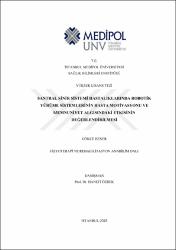| dc.contributor.advisor | Özbek, Hanefi | |
| dc.contributor.author | Bener, Gökçe | |
| dc.date.accessioned | 2021-06-24T12:05:32Z | |
| dc.date.available | 2021-06-24T12:05:32Z | |
| dc.date.issued | 2018 | en_US |
| dc.date.submitted | 2018-07-05 | |
| dc.identifier.citation | Bener, G. (2018). Santral sinir sistemi hastalıklarında robotik yürüme sistemlerinin hasta motivasyonu ve memnuniyet algısındaki etkisinin değerlendirilmesi. (Yayınlanmamış yüksek lisans tezi). İstanbul Medipol Üniversitesi Sağlık Bilimleri Enstitüsü, İstanbul. | en_US |
| dc.identifier.uri | https://hdl.handle.net/20.500.12511/7306 | |
| dc.description.abstract | Bu çalışmada santral sinir sistemi hastalıklarında rehabilitasyon programı dahilinde uygulanan robotik yürüme sistemlerinin hastanın motivasyonuna ve memnuniyetine olan etkisi araştırılmıştır. Çalışmaya santral sinir sistemi hastalığı bulunan ve robotik yürüme (Lokomat) tedavisi almakta olan 30 hasta dahil edilmiştir. Hastalar 1 ay boyunca haftanın 5 günü 30 dk süresince robotik yürüme sistemlerinde çalışmıştır. Çalışmaya dahil edilen hastalar tedavilerinin 1. ve 30. seanslarında, Barthel Günlük Yaşam Aktiviteleri İndeksi, SF-36 Yaşam Kalitesi Ölçeği, İçsel Güdülenme Envanteri (İGE) ve çalışmaya özel hazırlanmış Robotik Rehabilitasyon Hasta Motivasyon ve Memnuniyet Anketi kullanılarak değerlendirilmiştir. Hasta bilgileri hasta tanıtım formu ile toplanmıştır. Olguların ortalama yaşının 49.37 ve tanısı üzerinden geçen sürelerin 3-12 ay şeklinde yoğunlukta olduğu görülmüştür. Yapılan değerlendirme sonuçlarına göre santral sinir sistemi hastalığı bulunan hastaların Barthel skorlarının ve SF-36 yaşam kalitesi skorlarının tedavi ile anlamlı seviyede arttığı, Barthel skorları ile SF-36 yaşam kalitesi skorları arasında pozitif bir ilişki bulunduğu görülmüştür. Barthel skoru düşük olan hastalarda robotik yürüme sistemlerinin motivasyon ve memnuniyet değişkenleri üzerinde anlamlı bir ilişkisi saptanmamıştır. Santral Sinir Sistemi hastalarında motivasyon anketleriyle elde edilen skorlarda anlamlı artışlar görülmüştür. İçsel Güdülenme Envanteri ile Robotik Rehabilitasyon Hasta Motivasyon ve Memnuniyet Anketi skorları arasında pozitif yönlü orta derecede bir korelasyon olduğu saptanmıştır. Robotik yürüme tedavisi gören hastaların %73,3'ü kullanılan Lokomat cihazını tavsiye edilir bulmuştur. Çalışmaya dahil edilen hastaların %50'si genel memnuniyete sahip olduklarını ifade etmişlerdir. Elde edilen veriler doğrultusunda rehabilitasyon programında robotik yürüme tedavisi alan santral sinir sistemi hastalarının seanslar ilerledikçe memnuniyet ve motivasyon algısında artış görülmüştür. Motivasyon ve memnuniyet artışları ile bağımsızlık ve yaşam kalitesi artışları arasında bir bağlantı bulunamamıştır. Sonuç olarak yürüme bozukluğu için kullanılan robotik yürüme sistemlerinin santral sinir sistemi hastalığı bulunan hastalarda bağımsızlık düzeyini geliştirdiği ve yaşam kalitesini olumlu yönde etkilediği söylenebilir. Rehabilitasyon sürecinin uzun olacağı bilinen bu hastalık gruplarında, yürüme bozukluğunun tedavisi için klasik fizyoterapi programlarına ek olarak robotik yürüme sistemlerinin kullanılması tavsiye edilebilir. | en_US |
| dc.description.abstract | In this study, the effect of robotic gait systems applied within the rehabilitation program on central nervous system diseases was investigated to the motivation and satisfaction of the patient. Thirty patients with central nervous system disease who were taking the robotic walking (Lokomat) treatment were included in the study. The patients worked for 1 month during 5 days a week for 30 minutes in robotic walking systems. Patients included in the study were assessed using the Barthel Daily Living Activity Index, the SF-36 Quality of Life Scale, the Internal Motivation Inventory (IMI), and the Robotic Rehabilitation Patient Motivation and Satisfaction Questionnaire tailored to the study at sessions 1 and 30 of the interventions. Patient information was collected with patient identification formThe mean age of the cases was 49.37 and the time spent on the diagnosis was found to be 3-12 months. According to the evaluation results, Barthel scores and SF-36 quality of life scores of patients with central nervous system disease increased significantly at the treatment level, and Barthel scores and SF-36 quality of life scores were found to be positively correlated. In patients with low Barthel score, no significant relationship was found between motivation and satisfaction variables of robotic walking systems. Significant increases were seen in the scores obtained by motivation questionnaires in the central nervous system patients. A positive moderate correlation was found between the Internal Motivation Inventory and Robotic Rehabilitation Patient Motivation and Satisfaction Questionnaire scores 73.3% of the patients who were treated with robotic walking therapy found the Lokomat device to be recommended. 50% of the patients included in the study expressed general satisfaction. As the sessions of the central nervous system patients who received robotic walking therapy in the rehabilitation program in accordance with the obtained data progressed, satisfaction and motivation perception increased. There is no link between motivation and satisfaction increases and independence and quality of life increases. As a result, it can be said that robotic gait systems used for gait disturbance improved the independence level in patients with central nervous system disease and affected quality of life positively. In these disease groups, where the rehabilitation process is known to be long, it may be advisable to use robotic walking systems in addition to conventional physiotherapy programs for the treatment of gait disturbances. | en_US |
| dc.language.iso | tur | en_US |
| dc.publisher | İstanbul Medipol Üniversitesi Sağlık Bilimleri Enstitüsü | en_US |
| dc.rights | info:eu-repo/semantics/openAccess | en_US |
| dc.subject | Lokomat | en_US |
| dc.subject | Memnuniyet | en_US |
| dc.subject | Motivasyon | en_US |
| dc.subject | Robotik Yürüme Sistemleri | en_US |
| dc.subject | Santral Sinir Sistemi Hastalıkları | en_US |
| dc.subject | Lokomat | en_US |
| dc.subject | Satisfaction | en_US |
| dc.subject | Motivation | en_US |
| dc.subject | Robotic Walking Systems | en_US |
| dc.subject | Central Nervous System Diseases | en_US |
| dc.title | Santral sinir sistemi hastalıklarında robotik yürüme sistemlerinin hasta motivasyonu ve memnuniyet algısındaki etkisinin değerlendirilmesi | en_US |
| dc.title.alternative | Evaluation of patient motivation and satisfaction perception of robotic walking systems in central nervous system diseases | en_US |
| dc.type | masterThesis | en_US |
| dc.department | İstanbul Medipol Üniversitesi, Sağlık Bilimleri Enstitüsü, Fizyoterapi ve Rehabilitasyon Ana Bilim Dalı | en_US |
| dc.relation.publicationcategory | Tez | en_US |


















